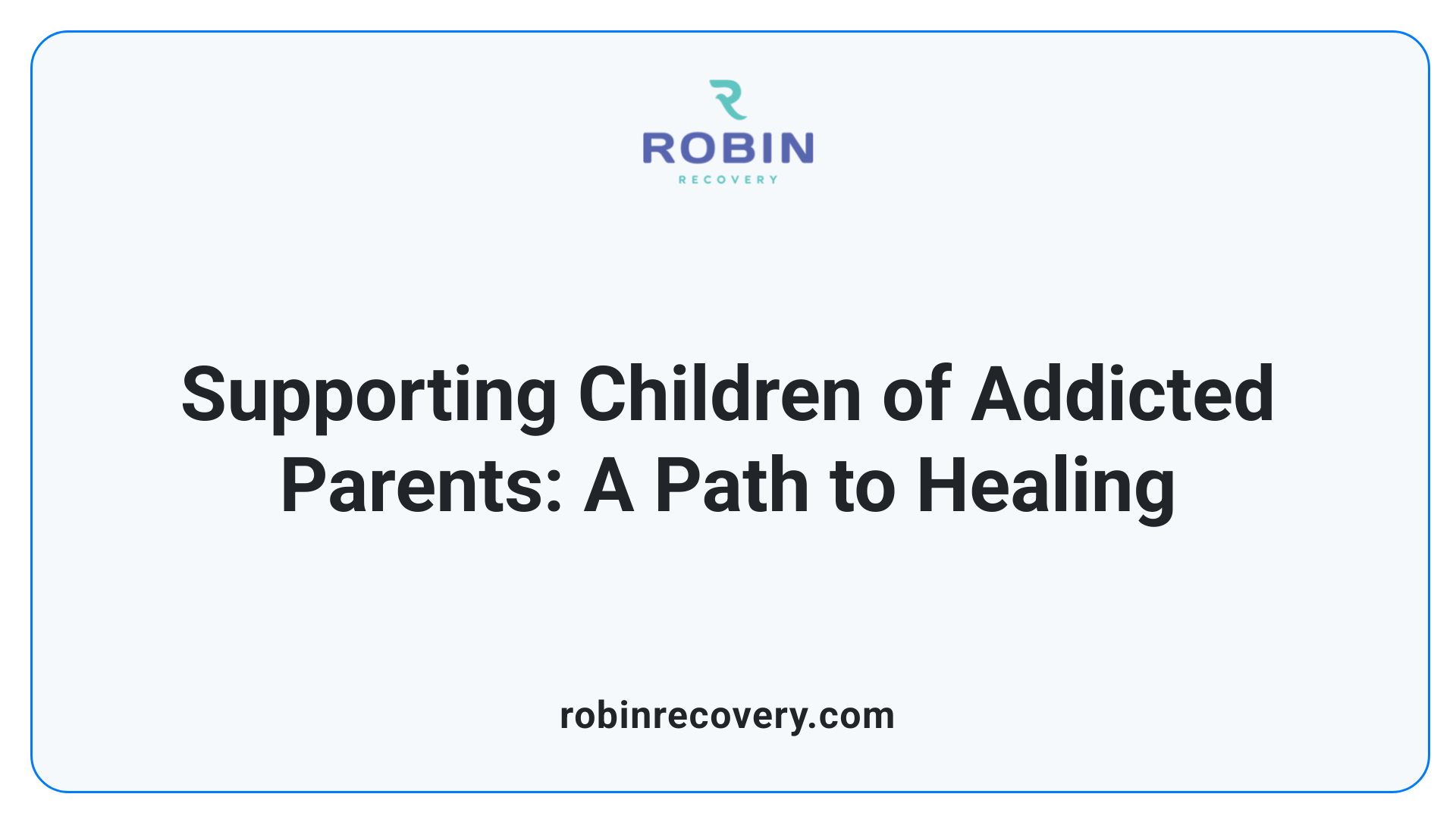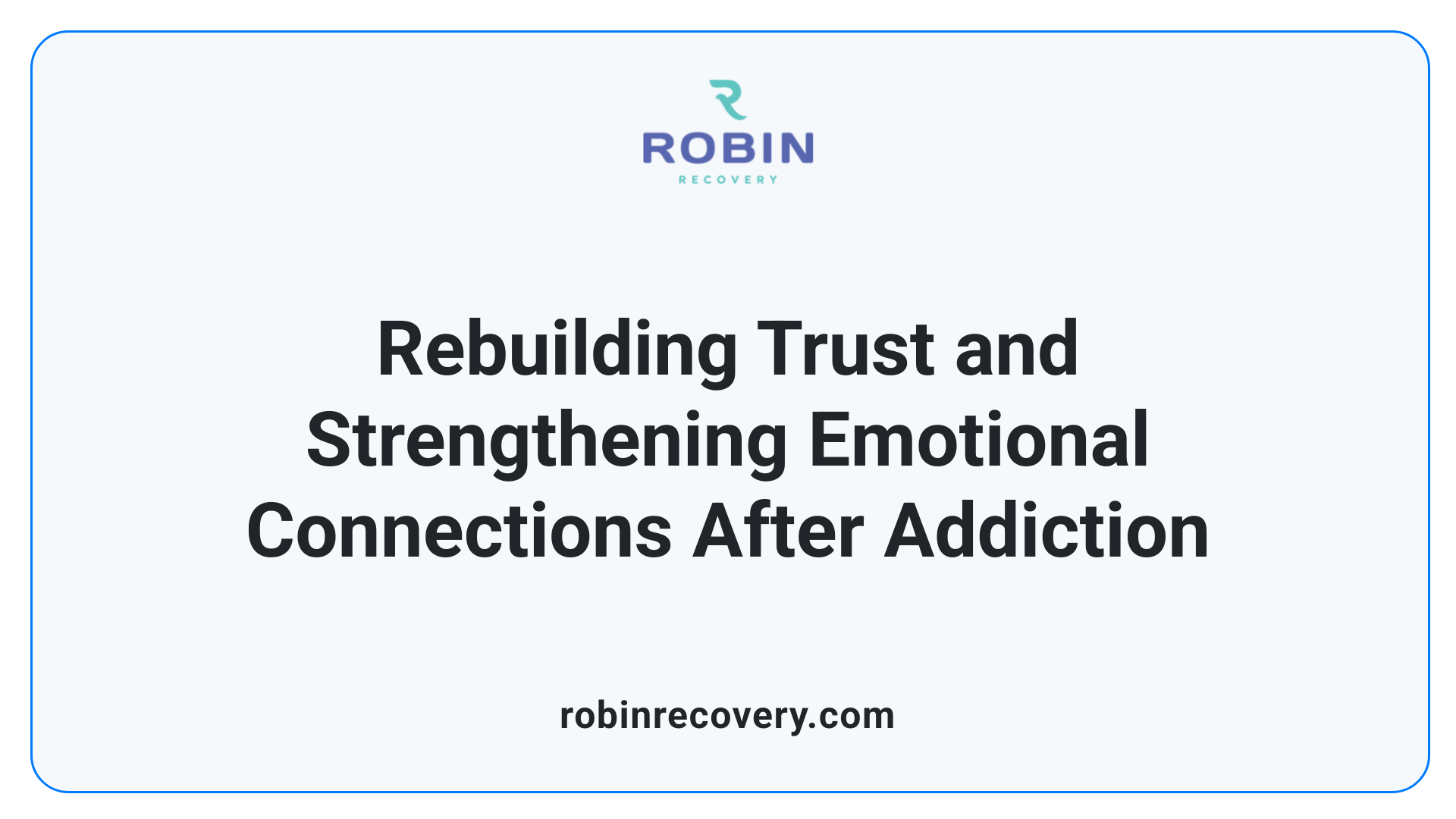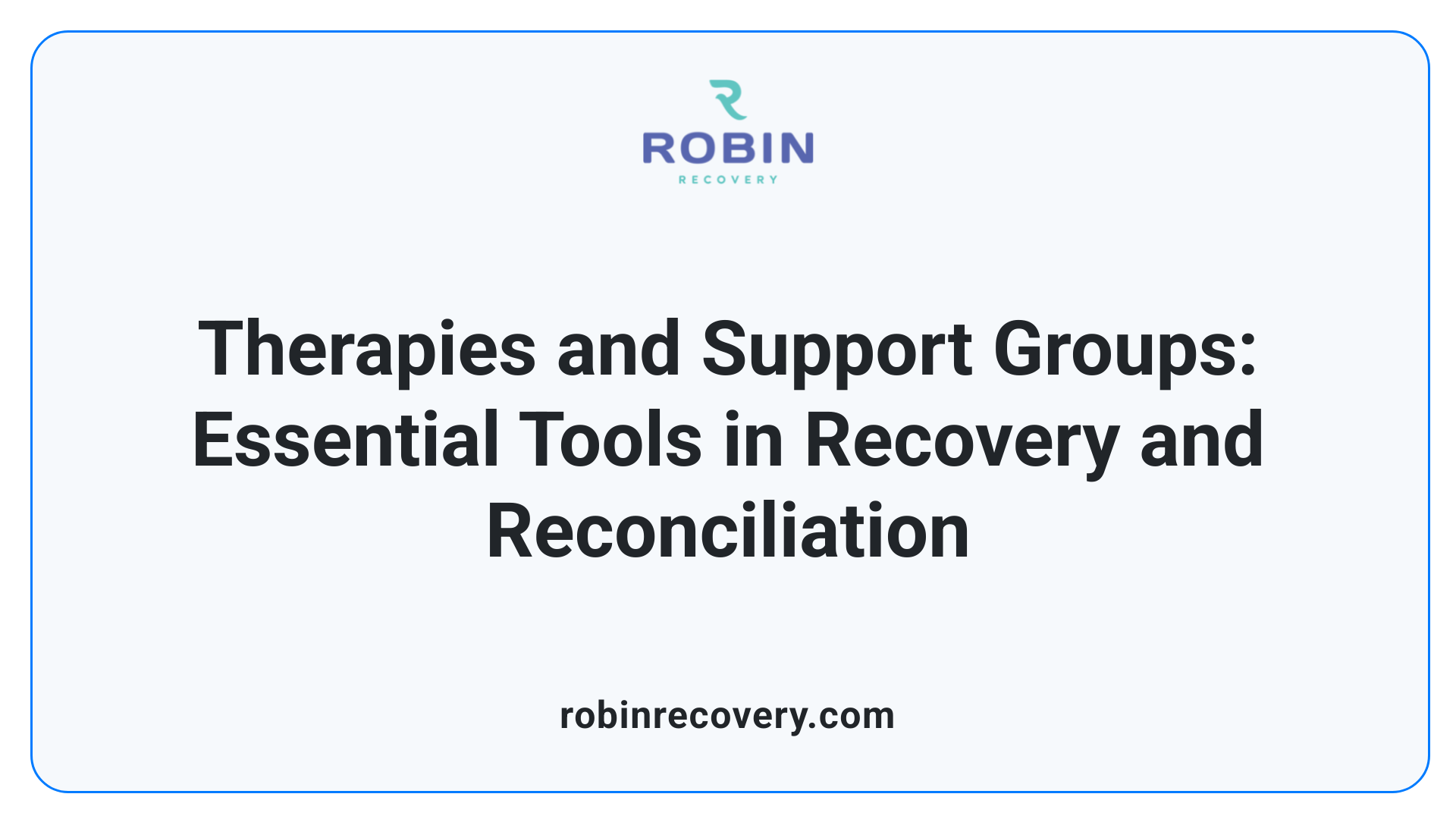How to Rebuild a Healthy Parent-Child Relationship After Addiction

Understanding the Impact of Addiction on Family Dynamics
Addiction is a complex disease that deeply affects family relationships, especially between parents and children. The emotional, psychological, and physical toll can lead to broken trust, emotional wounds, and strained bonds. Recognizing these impacts is the first step toward healing and rebuilding trust after recovery. This article explores effective strategies, therapeutic approaches, and support systems that facilitate the journey toward a healthier, stronger parent-child relationship post-addiction.
The Lingering Effects of Parental Addiction on Children

How does having a parent with an addiction affect a child?
Having a parent with an addiction can profoundly impact a child's emotional well-being, often leading to distress, anxiety, depression, and behavioral issues. The instability caused by active addiction—such as neglect, emotional withdrawal, and possible abuse—creates an environment of uncertainty and insecurity for children.
Children living in such households frequently face disruptions in their daily routines and relationships, which can hinder their social development. Many experience feelings of guilt, shame, or responsibility for their parent's behavior, especially if they assume adult roles prematurely. The emotional trauma of witnessing a loved one's struggles, coupled with recurrent betrayals and broken trust, leaves lasting scars.
Behavioral problems are common, including trouble in school, aggression, withdrawal, or risk-taking behaviors. Over time, these children may develop a distrust of others or anxiety about relationships, affecting their future interpersonal connections.
Moreover, children of addicted parents are at increased risk of developing their own substance use problems. The environment of chaos and normalization of drug or alcohol use elevates their vulnerability to experimenting with substances, perpetuating a cycle of addiction.
Supportive interventions, such as counseling, family therapy, and community programs like those provided through the Hanley Foundation, are vital. These resources help children process their experiences, rebuild trust, and foster healthy emotional growth.
In summary, parental addiction extends beyond the individual, significantly shaping a child's mental health, behavior, and life trajectory. Recognizing these impacts underscores the importance of comprehensive support for affected children and families.
Strategies for Rebuilding Trust and Emotional Bonds

What are effective strategies for rebuilding a healthy parent-child relationship after addiction?
Rebuilding a parent-child relationship after addiction is a gradual process that requires patience, effort, and sincerity. One of the most vital steps is practicing open and honest communication. Parents need to share their recovery journey transparently, answer questions age-appropriately, and listen actively to their children’s concerns.
Establishing consistent boundaries and routines helps create a sense of stability and security for children. Clear rules regarding living arrangements, communication, and responsibilities support healthy relationships and prevent enabling behaviors.
Taking responsibility and demonstrating accountability are essential. Parents should own their past mistakes, apologize sincerely, and show humility. Making genuine amends by repairing damaged trust illustrates their commitment to change.
Behaviorally, it’s important to consistently demonstrate healthy habits, such as attending treatment, avoiding substances, and following through on promises. These actions reinforce reliability and help rebuild confidence.
Seeking professional support can significantly facilitate the process. Family therapy or individual counseling can address underlying issues, improve communication skills, and help process emotions healthily.
Support groups like Al-Anon or Nar-Anon offer community encouragement and shared strategies for maintaining sobriety while strengthening bonds with loved ones. Educating children about addiction as a chronic disease helps foster understanding and reduce misconceptions.
Most importantly, parents should be patient and persistent. Rebuilding trust and emotional connection takes time, and ongoing effort is necessary to sustain progress. By combining effective communication, consistent routines, accountability, sincere amends, and healthy behaviors, families can repair and strengthen their relationships after addiction.
Strategy Actions Notes Honest communication Share recovery updates, answer questions truthfully Age-appropriate explanations enhance understanding Boundaries and routines Set clear rules, maintain stability Provides security and predictability Responsibility and accountability Own actions, apologize sincerely, repair harm Builds trust through integrity Making sincere amends Face those harmed, avoid justifications Demonstrates remorse and commitment to change Healthy behaviors Consistency in sobriety, attend therapy, do what’s promised Reinforces trustworthiness
To learn more, searching “Parent-child relationship repair after addiction” provides additional insights and support strategies.
The Role of Therapeutic Support in Recovery and Reconciliation

How do family therapy, couples counseling, and individual counseling contribute to relationship rebuilding?
Therapeutic support plays a fundamental role in healing relationships affected by addiction. Family therapy helps to improve communication, address enabling behaviors, and rebuild trust among family members. It provides a safe space for everyone to express feelings, understand each other's experiences, and learn healthier ways to interact.
Couples counseling focuses on addressing specific issues within romantic relationships, promoting honest exchanges, setting boundaries, and restoring intimacy and trust. It equips partners with communication tools to navigate challenges and rebuild their bond.
Individual counseling is crucial for the recovering person to work through personal issues, develop coping skills, and gain insight into behaviors affecting their relationships. It also helps manage underlying trauma or mental health concerns that may impact recovery.
Combining these therapies offers a comprehensive approach, fostering understanding, accountability, and emotional security—cornerstones for positive relational changes post-addiction.
What support groups are beneficial for loved ones affected by addiction?
Support groups like Al-Anon, Nar-Anon, and SMART Recovery provide community and emotional support for family members and friends of addicts. These groups offer a platform to share experiences, receive guidance, and learn coping strategies.
Al-Anon and Nar-Anon specifically support loved ones struggling with the emotional strain of a family member's addiction. They help participants recognize enabling behaviors, set healthy boundaries, and foster resilience.
SMART Recovery focuses on self-empowerment and managing addiction through evidence-based techniques, benefiting not only addicts but also those supporting them.
Participation in these groups promotes a sense of belonging, reduces feelings of helplessness, and encourages ongoing recovery efforts.
Why is it important to address underlying issues like trauma and mental health?
Addiction often intertwines with unresolved trauma and mental health disorders such as depression, anxiety, or PTSD. Addressing these root causes during recovery is vital to prevent relapse and facilitate genuine healing.
Therapies like trauma-focused therapy or psychiatric support can help individuals process past experiences, develop healthier thinking patterns, and manage mental health symptoms.
Treating underlying issues enhances emotional stability, improves self-esteem, and enables individuals to establish healthier relationships. It also reduces the risk of substance use as a maladaptive coping mechanism.
Are relationships with recovering addicts likely to improve over time?
Relationships with recovering addicts tend to improve gradually as the individual maintains sobriety, builds trust, and adopts healthier communication routines. Supportive social environments, commitment to ongoing therapy, and setting clear boundaries are essential.
Typically, waiting at least one year of sustained sobriety before pursuing new romantic relationships helps ensure stability and emotional readiness. As recovery progresses, individuals often become better at recognizing unhealthy dynamics, setting boundaries, and choosing supportive partners.
Overall, with consistent effort and fostering supportive networks, relationships tend to become more stable and meaningful as the recovery journey advances.
Addressing Past Hurts and Making Amends

Rebuilding trust and emotional bonds after addiction is a gradual but vital process that requires sincerity, patience, and consistent effort.
Harm Repair begins with the addicted individual taking responsibility for their actions that may have caused pain or disruption within the family. This involves openly apologizing and making genuine efforts to repair the damage. Making amends may include actions like helping with household responsibilities, supporting loved ones emotionally, or simply being present and attentive.
Acknowledging Past Mistakes is an essential step towards healing. It’s important for the recovering parent or individual to be honest about their past behaviors, including lying, stealing, or neglecting responsibilities. Such acknowledgment not only demonstrates responsibility but also helps to reduce feelings of guilt and rebuild credibility.
Fostering Forgiveness and Understanding involves creating a safe space for open dialogue. Family members should be encouraged to express their feelings and frustrations without fear of judgment. Validating these emotions, listening actively, and avoiding minimization foster empathy and help to pave the way for forgiveness.
How can parents rebuild trust and emotional connection with their children after overcoming addiction?
After overcoming addiction, parents can rebuild trust and emotional connection with their children by practicing honesty and transparency, openly acknowledging past mistakes and making sincere amends. Engaging in shared recovery activities, such as mindfulness exercises or creative pursuits, can help strengthen bonds and foster understanding. It is essential for parents to prioritize their mental health by attending therapy, support groups, or using resources like the SAMHSA helpline for guidance and support. Demonstrating consistent sobriety and responsible behavior over time reassures children of their parent's commitment to a healthy lifestyle. Additionally, showing empathy, validating children's feelings, and practicing patience are crucial in rebuilding a positive, trusting relationship.
Rebuilding relationships also involves honoring healthy boundaries and cultivating open communication. This helps restore safety and predictability, allowing children to feel secure and valued again. It’s important to remember that trust takes time to re-establish; parents and family members should remain committed, supportive, and understanding throughout the recovery journey.
By approaching this process with compassion and dedication, families can not only repair past wounds but also foster stronger, more resilient relationships, paving the way for sustained recovery and mutual respect.
Limitations and Expectations in Reconciliation
Is it realistic to expect relationships with recovering addicts to improve over time?
Yes, relationships with recovering individuals often improve gradually as time passes. The process of rebuilding trust, establishing healthier communication patterns, and restoring emotional bonds takes patience and consistent effort.
Over the course of sobriety and recovery, individuals learn to be honest, responsible, and accountable for their actions. Supportive social networks, including family, friends, and professionals, play a significant role in fostering this positive change.
It’s generally best to allow at least one year of sustained sobriety before considering entering new romantic relationships. This period provides a chance for emotional stability and resilience to develop.
As recovery progresses, individuals become more aware of unhealthy relationship patterns. They learn to set boundaries, choose supportive partners, and avoid relapses or enabling behaviors. The journey involves persistent effort, patience, and understanding that rebuilding trust is a slow process.
While setbacks can happen, consistent commitment and ongoing support often lead to more stable and trusting relationships. It’s crucial to manage expectations, acknowledging that some relationships may take years to fully heal, and not all may be salvageable.
In summary, with time, patience, and ongoing work on personal growth and communication, the prospects of repairing and strengthening relationships after addiction significantly increase.
Community Resources and Support Systems
What resources are available to support family members and loved ones in recovery?
Families affected by a loved one's addiction have several valuable resources at their disposal to aid in their healing process.
The SAMHSA (Substance Abuse and Mental Health Services Administration) National Helpline is a crucial starting point. It operates 24 hours a day, 365 days a year, offering free and confidential assistance. This helpline provides referrals to local treatment centers, support groups, and community organizations that can support both the recovering individual and their family members.
Support groups specifically designed for family members, like Al-Anon and Nar-Anon, are vital community-driven resources. These groups create a space for sharing experiences, overcoming feelings of helplessness, and learning coping strategies. SMART Recovery offers another secular support option that emphasizes addiction education and self-empowerment.
Family therapy and counseling also play a critical role. These professional services help address relational damage caused by addiction, facilitate honest communication, and promote healthy boundaries. Engaging in therapy can rebuild trust and improve family dynamics during recovery.
In some cases, families may require legal and housing support. Navigating custody issues or ensuring a stable environment often involves working with family lawyers or housing authorities. These resources help create a safe and nurturing setting for recovery and rebuilding.
Together, these tools and services empower family members to actively participate in the recovery process, fostering stronger relationships and a healthier environment for all involved.
Resource Type Description Additional Notes SAMHSA Helpline Free, confidential support and referrals Available 24/7 in English and Spanish Support Groups Community groups like Al-Anon, Nar-Anon, SMART Re Offer emotional support and shared experiences Family Therapy Professional counseling to repair relationships Essential for rebuilding trust Legal & Housing Support Assistance with custody, legal issues, and housing Ensures safety and stability for families
For more information, searching
A Path Forward Toward Healing and Connection
Rebuilding a parent-child relationship after addiction is a challenging yet rewarding journey that requires patience, consistent effort, and professional support. Understanding the profound impact addiction can have on family dynamics helps in fostering empathy and compassion. By utilizing therapeutic interventions, community resources, and honest communication, parents and children can work through past hurts, rebuild trust, and develop stronger bonds. While the process may take years, hope and persistence can lead to a resilient, loving relationship that flourishes beyond the shadows of addiction. Remember, recovery is a continuous journey—each step forward is a testament to resilience and love.
References
- National Helpline for Mental Health, Drug, Alcohol Issues - SAMHSA
- Repairing Relationships Broken by Addiction
- From Estrangement to Connection: Rebuilding Family After Addiction
- Rebuilding and Repairing Relationships After Addiction
- Repairing Relationships After Substance Use Disorder - Psych Central
- How to Rebuild Your Connection to Your Children in Recovery
- How to Rebuild Trust with Friends and Family During Recovery
- Children of Addicted Parents Guide: The Impact of Substance Use ...
